Success Stories
These are just a few of the success stories that GDEPL has accomplished over the years since its inception. Each project reflects our commitment to innovative waste management solutions, environmental sustainability, and community empowerment. Through these achievements, GDEPL continues to make a significant impact, transforming challenges into opportunities and setting new standards in the industry.
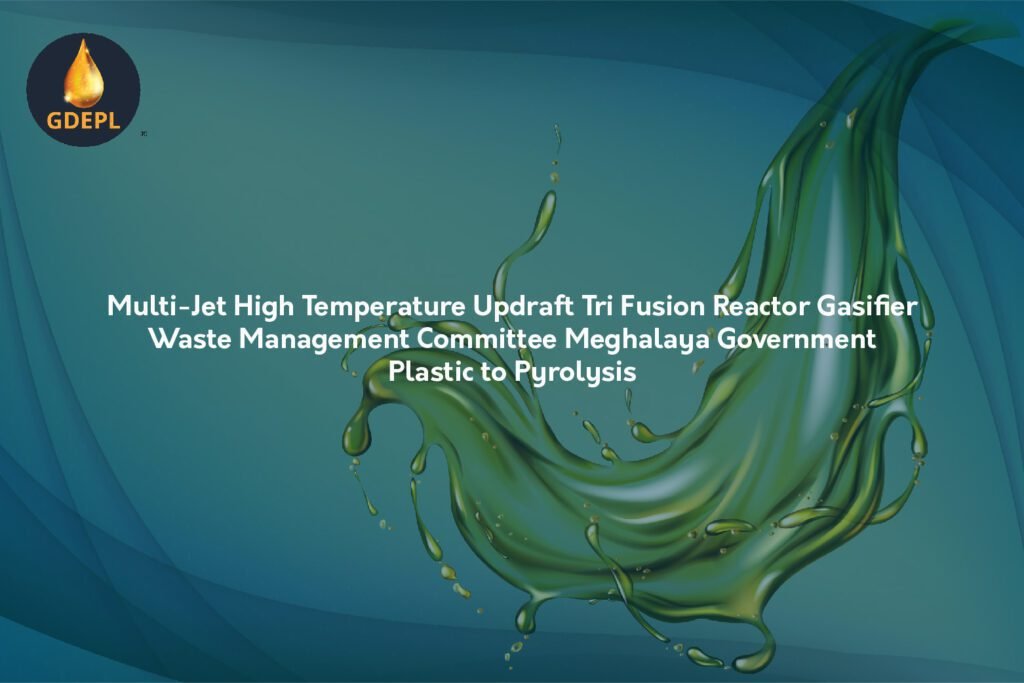
Multi-Jet High Temperature Updraft Tri Fusion Reactor Gasifier Waste Management Committee Meghalaya Government Plastic to Pyrolysis.
GDEPL has implemented a groundbreaking Multi-Jet High Temperature Updraft Tri Fusion Reactor Gasifier for the Waste Management Committee of the Meghalaya Government in the village of Laitumiong. This innovative project transforms legacy landfill plastic into valuable resources, notably cooking gas, providing significant environmental, economic, and social benefits to the local community.
Project Overview and Impact:
The project is located in Laitumiong, a village in Meghalaya, where legacy plastic waste has accumulated over years. The primary objective is to eliminate this plastic waste from the environment while simultaneously generating useful byproducts that benefit the community.
The Multi-Jet High Temperature Updraft Tri Fusion Reactor Gasifier is at the heart of this initiative. It uses a sophisticated process that involves high-temperature pyrolysis and gasification to break down plastic waste. The technology efficiently converts the waste into useful products, with zero legacy landfill and pollution.
One of the most remarkable outcomes of this process is the production of syngas, a byproduct that is rich in energy. In Laitumiong, this gas is captured and stored in gas storage balloons. The villagers then use this gas as a clean and sustainable source of cooking fuel. This not only provides an eco-friendly alternative to traditional fuels but also significantly reduces household energy costs.
The project represents a significant environmental revolution. By processing the legacy landfill plastic, the initiative ensures that harmful pollutants are not released into the environment. The process eliminates the risk of soil and water contamination, which is often associated with plastic waste. Moreover, by turning waste into a resource, the project effectively contributes to the concept of a circular economy, where nothing is wasted, and everything is reused.
Beyond its environmental impact, the project has considerable social and economic benefits. It creates employment opportunities for the local population, particularly in the areas of waste collection, sorting, and operation of the gasification plant. The provision of free or low-cost cooking gas to households also improves the standard of living in the village, as families save on fuel expenses.
- Zero Legacy Landfill: The project completely eradicates the legacy landfill problem in Laitumiong, ensuring that no plastic waste is left untreated.
- Zero Pollution: The process is designed to minimize environmental impact, with no harmful emissions or effluents.
- Employment Generation: The project provides direct and indirect employment opportunities to the local community.
- Cooking Gas for Households: The syngas produced is stored in balloons and distributed to households for cooking, offering a sustainable and cost-effective fuel solution.
The success of this project has the potential to transform the entire community of Laitumiong. By addressing waste management issues and providing clean energy, the project enhances the quality of life for villagers and sets a precedent for similar initiatives in other regions.
The implementation of the Multi-Jet High Temperature Updraft Tri Fusion Reactor Gasifier in Laitumiong could serve as a model for other rural areas facing similar challenges with plastic waste. The revolutionary approach of converting waste into cooking gas not only addresses environmental concerns but also empowers local communities by providing them with valuable resources. As the project continues to develop, it is likely to inspire further innovations in waste management and renewable energy in Meghalaya and beyond.
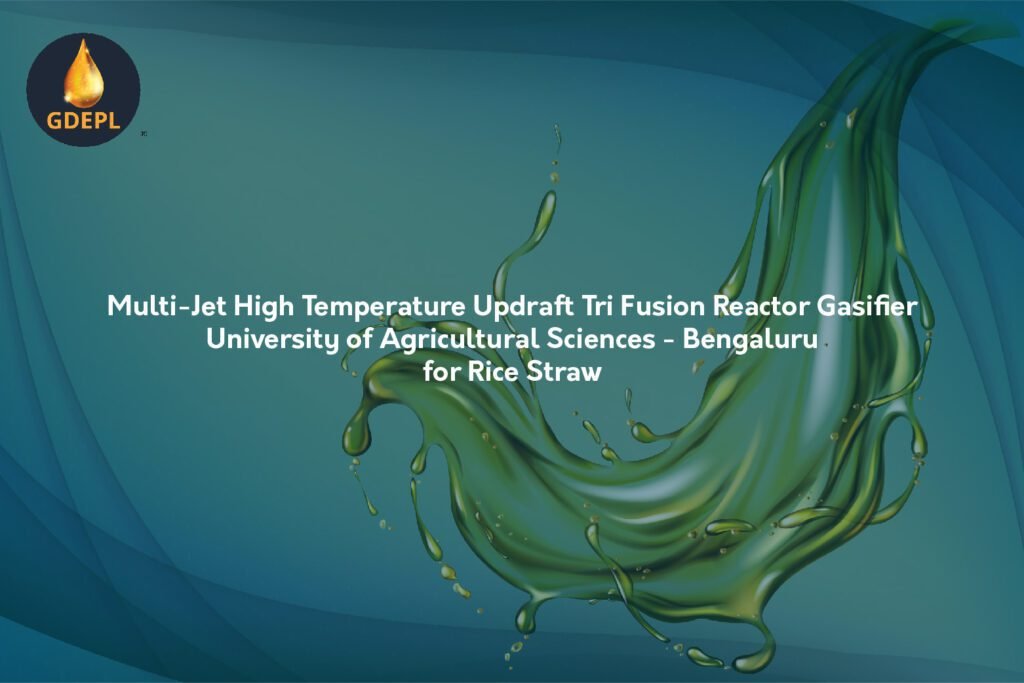
Multi-Jet High Temperature Updraft Tri Fusion Reactor Gasifier University of Agricultural Sciences – Bengaluru for Rice Straw Production.
GDEPL has installed a Multi-Jet High Temperature Updraft Tri Fusion Reactor Gasifier at the University of Agricultural Sciences in Bengaluru, specifically designed for the processing and conversion of rice straw. This installation addresses the challenges associated with agricultural waste management, particularly the disposal of rice straw, which is a major byproduct of rice cultivation.
Key Features and Highlights of the Installation:
The gasifier is located at the University of Agricultural Sciences, Bengaluru, an institution dedicated to advancing agricultural research and practices. The installation is part of a broader initiative to explore sustainable methods for managing agricultural residues, with a focus on rice straw, a commonly discarded material after rice harvesting.
The Tri Fusion Reactor Gasifier incorporates a sophisticated technology that integrates dehydration, pyrolysis, and gasification within a single system. This approach ensures that rice straw is processed efficiently, with minimal environmental impact. The reactor is capable of handling the high moisture content of rice straw, converting it into valuable byproducts such as biochar, syngas, and green coal.
The gasifier employs a Multi-Jet system that introduces multiple streams of air or oxygen into the reactor, enhancing the combustion process at high temperatures. This updraft configuration is particularly effective in processing rice straw, which tends to have a low bulk density and high silica content. The high-temperature environment ensures that the rice straw is fully converted into energy-rich byproducts, while also minimizing the emission of harmful pollutants.
The installation is tailored to address the specific needs of the agricultural sector, particularly in regions where rice cultivation is prevalent. By converting rice straw into useful products, the gasifier provides a sustainable alternative to traditional practices such as open-field burning, which contributes to air pollution and greenhouse gas emissions. The byproducts generated can be used as soil amendments or as energy sources for agricultural operations, further enhancing the sustainability of farming practices.
The gasifier contributes to the reduction of agricultural waste and the mitigation of pollution associated with the disposal of rice straw. By converting waste into valuable resources, the installation also offers economic benefits to farmers and agricultural institutions. The production of biochar, for instance, can improve soil fertility and carbon sequestration, while syngas and green coal can be used as renewable energy sources, reducing the reliance on fossil fuels.
The Multi-Jet High Temperature Updraft Tri Fusion Reactor Gasifier at the University of Agricultural Sciences in Bengaluru represents a significant step forward in the sustainable management of agricultural waste. Its successful operation not only addresses the immediate challenge of rice straw disposal but also sets a precedent for similar installations across agricultural regions in India. As the demand for sustainable agricultural practices grows, this technology is poised to play a crucial role in helping farmers and agricultural institutions manage waste more effectively while contributing to environmental conservation and economic development.
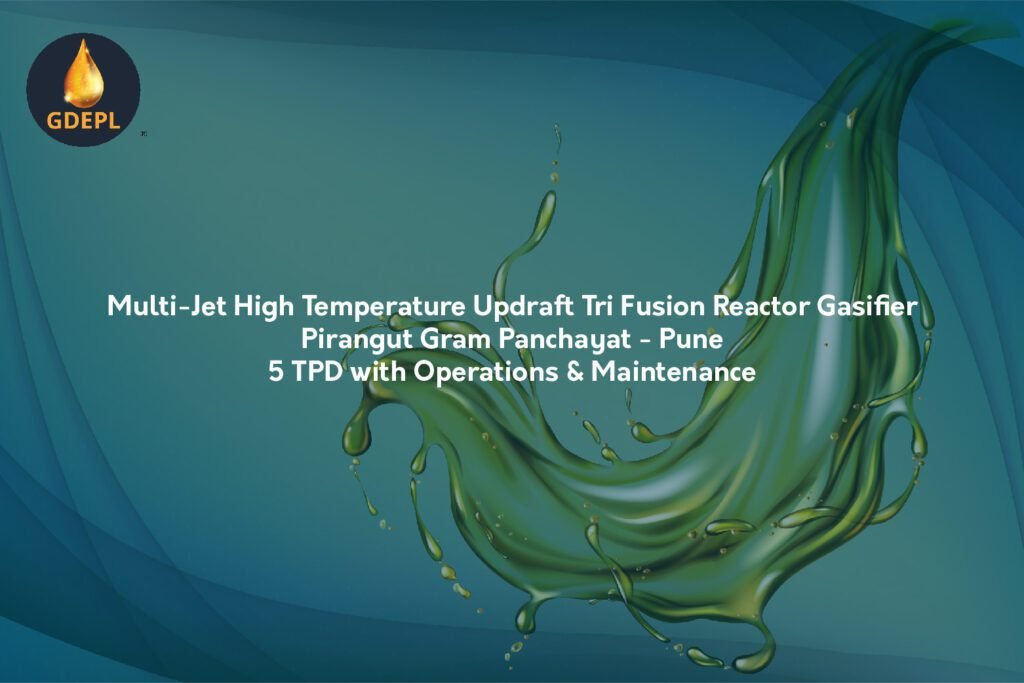
Multi-Jet High Temperature Updraft Tri Fusion Reactor Gasifier Pirangut Gram Panchayat – Pune – 5 TPD.
GDEPL has installed a Multi-Jet High Temperature Updraft Tri Fusion Reactor Gasifier at the University of Agricultural Sciences in Bengaluru, specifically designed for the processing and conversion of rice straw. This installation addresses the challenges associated with agricultural waste management, particularly the disposal of rice straw, which is a major byproduct of rice cultivation.
Key Features and Highlights of the Installation:
The gasifier is located at the University of Agricultural Sciences, Bengaluru, an institution dedicated to advancing agricultural research and practices. The installation is part of a broader initiative to explore sustainable methods for managing agricultural residues, with a focus on rice straw, a commonly discarded material after rice harvesting.
The Tri Fusion Reactor Gasifier incorporates a sophisticated technology that integrates dehydration, pyrolysis, and gasification within a single system. This approach ensures that rice straw is processed efficiently, with minimal environmental impact. The reactor is capable of handling the high moisture content of rice straw, converting it into valuable byproducts such as biochar, syngas, and green coal.
The gasifier employs a Multi-Jet system that introduces multiple streams of air or oxygen into the reactor, enhancing the combustion process at high temperatures. This updraft configuration is particularly effective in processing rice straw, which tends to have a low bulk density and high silica content. The high-temperature environment ensures that the rice straw is fully converted into energy-rich byproducts, while also minimizing the emission of harmful pollutants.
The installation is tailored to address the specific needs of the agricultural sector, particularly in regions where rice cultivation is prevalent. By converting rice straw into useful products, the gasifier provides a sustainable alternative to traditional practices such as open-field burning, which contributes to air pollution and greenhouse gas emissions. The byproducts generated can be used as soil amendments or as energy sources for agricultural operations, further enhancing the sustainability of farming practices.
The gasifier contributes to the reduction of agricultural waste and the mitigation of pollution associated with the disposal of rice straw. By converting waste into valuable resources, the installation also offers economic benefits to farmers and agricultural institutions. The production of biochar, for instance, can improve soil fertility and carbon sequestration, while syngas and green coal can be used as renewable energy sources, reducing the reliance on fossil fuels.
The Multi-Jet High Temperature Updraft Tri Fusion Reactor Gasifier at the University of Agricultural Sciences in Bengaluru represents a significant step forward in the sustainable management of agricultural waste. Its successful operation not only addresses the immediate challenge of rice straw disposal but also sets a precedent for similar installations across agricultural regions in India. As the demand for sustainable agricultural practices grows, this technology is poised to play a crucial role in helping farmers and agricultural institutions manage waste more effectively while contributing to environmental conservation and economic development.
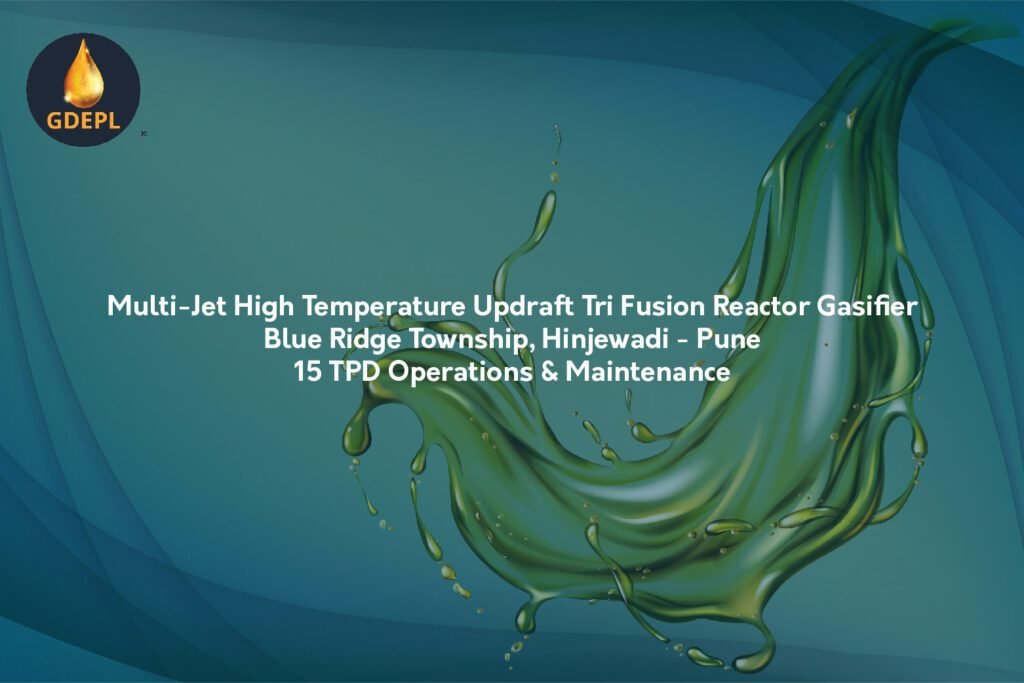
Multi-Jet High Temperature Updraft Tri Fusion Reactor Gasifier
Blue Ridge Township, Hinjewadi – Pune. 15 TPD
Multi-Jet High Temperature Updraft Tri-Fusion Reactor Gasifier at Blue Ridge Township in Hinjewadi, Pune. This cutting-edge facility is designed to manage and process Municipal Solid Waste (MSW) with a capacity of up to 15 tons per day (TPD). In addition to the installation, GDEPL is also responsible for the ongoing operations and maintenance of the gasifier, ensuring optimal performance and continuous waste disposal.
Key Features and Highlights of the Installation:
The gasifier is strategically located within the Pirangut Gram Panchayat area in Pune, serving the local community by managing municipal solid waste (MSW) generated within the vicinity. By processing up to 5 TPD, the gasifier plays a crucial role in reducing the burden on local landfills, mitigating environmental pollution, and supporting the Gram Panchayat’s efforts towards sustainable waste management.
The installation features a state-of-the-art Tri Fusion Reactor Gasifier, which represents a significant advancement in waste gasification technology. This reactor integrates three core processes—dehydration, pyrolysis, and gasification—within a single system. This integration ensures that the waste is processed more efficiently, with higher energy recovery rates and lower emissions compared to traditional gasification methods.
The gasifier operates with a Multi-Jet system that injects multiple streams of air or oxygen into the reactor at high temperatures. This updraft configuration enhances the combustion and conversion processes, allowing for a more complete breakdown of waste materials into syngas, green coal, and other byproducts. The high temperature ensures that volatile organic compounds (VOCs) and other pollutants are minimized, resulting in cleaner emissions.
With a daily capacity of 5 TPD, the gasifier is ideally suited for the waste management needs of smaller communities like Pirangut. It efficiently processes various types of waste, including mixed municipal waste, agricultural waste, and other organic materials, turning them into valuable energy resources such as syngas and biochar.
The gasifier is designed to meet stringent environmental regulations, ensuring that its operations have minimal negative impact on the local ecosystem. The Tri Fusion technology ensures that waste is processed with near-zero landfill requirements, reducing the environmental footprint of waste disposal. Additionally, the byproducts such as syngas and green coal can be used for energy generation, contributing to the local energy supply and reducing reliance on non-renewable resources.
This installation demonstrates GDEPL’s commitment to supporting local governance structures, like the Pirangut Gram Panchayat, in their efforts to manage waste sustainably. By providing advanced waste management technology, GDEPL is helping the local authorities to tackle waste disposal challenges effectively while promoting environmental conservation.
The Multi-Jet High Temperature Updraft Tri Fusion Reactor Gasifier at Pirangut Gram Panchayat is a model for small to medium-scale waste management solutions in rural and semi-urban areas. Its successful operation not only addresses the immediate waste disposal needs of the community but also sets a precedent for similar installations in other regions. As India continues to develop and urbanize, the demand for efficient and environmentally friendly waste management systems will only grow. GDEPL’s installation in Pirangut serves as a testament to the company’s ability to deliver innovative solutions that are both scalable and sustainable.
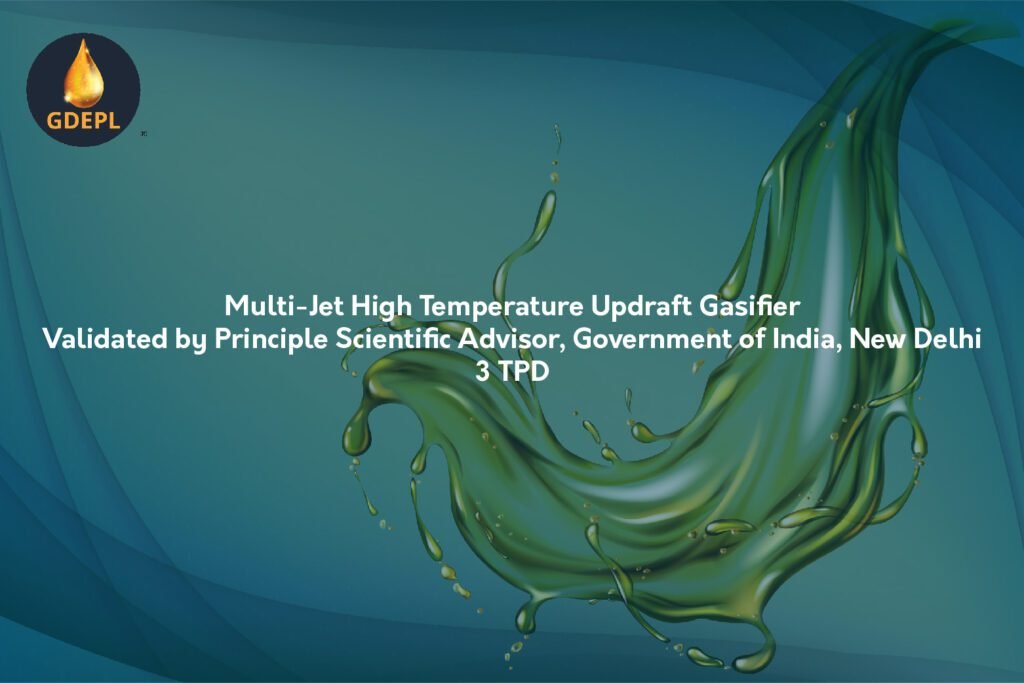
Multi-Jet High Temperature Updraft Gasifier – Validated by Principle Scientific Advisor, Government of India, New Delhi. 3 TPD.
GDEPL has successfully installed a state-of-the-art Multi-Jet High Temperature Updraft Gasifier at a plant owned by Invest India in Delhi, located near Jaffrabad Metro Station. This gasifier is capable of processing up to 3 tons of waste per day. The system has undergone thorough validation by the Office of the Principal Scientific Advisor to the Government of India, ensuring that it meets stringent standards for efficiency, safety, and environmental compliance. The Multi-Jet High Temperature Updraft Gasifier represents a significant advancement in waste-to-energy technology.
Key Features and Highlights of the Installation:
The installation and operation of the gasifier have been validated by the Office of the Principal Scientific Advisor to the Government of India. This validation underscores the technological sophistication and environmental compliance of the gasifier, making it a model for similar installations across the country.
The gasifier is installed at a plant strategically located near the Jaffrabad Metro Station in Delhi. This location is crucial for managing the solid waste generated in the area, providing a local solution to waste management and minimizing the need for long-distance waste transport.
The gasifier utilizes advanced Multi-Jet technology to enhance the combustion process, ensuring that waste is efficiently processed into syngas, oil, and green coal. The high-temperature updraft system ensures thorough decomposition of waste, reducing the residual matter to minimal levels.
With a processing capacity of 3 tons per day, the gasifier is capable of handling significant volumes of waste on a daily basis. This makes it an ideal solution for urban areas like Delhi, where waste generation is high and efficient disposal methods are required.
The gasifier not only addresses waste disposal but also contributes to sustainability by converting waste into usable energy forms such as syngas and green coal. This reduces the dependence on fossil fuels and contributes to cleaner energy production. Additionally, the gasifier minimizes the emission of pollutants, ensuring that the operation is environmentally friendly.
The installation of this gasifier is a significant step forward in addressing the waste management challenges in Delhi. It provides a localized solution for waste disposal, reducing the burden on landfills and contributing to the city’s overall waste management strategy.
The Multi-Jet High Temperature Updraft Gasifier installed at the Invest India-owned plant near Jaffrabad Metro Station represents a benchmark in waste management technology. Its successful operation, validated by the highest government authorities, paves the way for broader adoption of similar technologies across urban centers in India. As cities like Delhi continue to grapple with the challenges of waste management, such innovative solutions are crucial for achieving sustainability goals and ensuring a cleaner environment for future generations. GDEPL’s role in this project highlights its commitment to delivering cutting-edge, environmentally responsible waste management solutions.
On-Going & Upcoming Projects
GD Environmental Pvt. Ltd. has successfully commissioned a 20 TPD decentralized waste processing plant for the Pirangut Gram Panchayat, highlighting its leadership in rural waste-to-energy deployment. The plant employs an advanced MultiJet Hi-Temperature Gasifier designed to handle a wide range of organic and mixed waste, converting it into clean energy vectors such as syngas, biochar, and condensable oils. Following the formal awarding of the work order, the project transitioned swiftly from mobilization to full-scale operation. The installation reflects GDEPL’s capability to rapidly deploy complex technologies in semi-urban settings with minimal disruption. The gasifier system ensures high thermal efficiency and emission compliance, aligning with CPCB norms. Operating under a decentralized circular economy model, the plant diverts significant waste away from open dumping and landfilling. The initiative supports the Gram Panchayat’s goals for sustainability, energy recovery, and local resource utilization. It also enables potential carbon credit generation via methane avoidance and biochar sequestration. GDEPL’s O&M strategy ensures consistent throughput, real-time monitoring, and skilled local workforce engagement. As one of Maharashtra’s functional rural waste-to-energy sites, the Pirangut plant stands as a replicable model for gram panchayats nationwide.
GD Environmental Pvt. Ltd. has been awarded a prestigious work order from Pune Municipal Corporation for setting up a 20 TPD decentralized waste processing plant. The facility is designed to handle wet organic and mixed waste streams with a focus on resource recovery and minimal landfill use. Currently under implementation, the plant integrates drying, segregation, and thermochemical conversion technologies to produce high-value outputs such as biochar, oil, and syngas. This project comes with a robust five-year operations and maintenance contract to ensure consistent performance, compliance, and adaptability. It is a strategic move by PMC to strengthen urban waste infrastructure in alignment with Swachh Bharat and climate goals. The plant’s output is expected to significantly reduce methane emissions, qualifying for carbon credit generation. Located within the Pune metropolitan region, the site selection ensures accessibility, scalability, and reduced transportation emissions. GDEPL’s approach emphasizes environmental stewardship, circular economy, and social inclusivity through local employment. The project reinforces GDEPL’s leadership in modular waste-to-energy systems tailored for urban India. Once commissioned, it will stand as a benchmark in sustainable waste valorization for smart cities nationwide.
GD Environmental Pvt. Ltd. is spearheading the development of a 10 TPD waste-to-energy plant in Goa, aimed at decentralized waste valorization. The project has been officially allotted by the relevant municipal authority, with the work order currently in progress. Designed to handle Goa’s diverse municipal solid waste, the plant integrates drying, segregation, and thermochemical conversion to produce biochar, syngas, and pyrolysis oil. Its process architecture is tailored for humid coastal climates, enabling year-round performance. GDEPL will operate and maintain the plant for five years, ensuring consistency, compliance, and innovation. The project also aims to harness carbon credits by reducing methane emissions and promoting biochar sequestration. By minimizing landfill dependency, the initiative supports Goa’s sustainability goals, especially in tourism-sensitive zones. With a modular layout, the plant offers future scalability in line with urban growth and seasonal waste variations. The project will generate skilled and semi-skilled local employment, reinforcing community inclusion. Once operational, this facility will mark a milestone in eco-centric urban waste management for coastal India.
GD Environmental Pvt. Ltd. is actively implementing two decentralized waste processing units in Leh–Ladakh with capacities of 5 TPD and 3 TPD respectively. These plants are engineered to operate effectively in high-altitude conditions, tackling mixed and organic waste streams. The project has been formally awarded, and on-ground work is underway, including infrastructure setup and equipment installation. Leveraging modular drying and thermochemical technologies, the initiative focuses on generating biochar, pyrolysis oil, and syngas to maximize resource recovery. This deployment reflects GDEPL’s ability to adapt advanced waste-to-energy systems to remote and climatically challenging environments. The contract includes a five-year operations and maintenance period, ensuring system stability, uptime, and local skill development. By preventing open dumping and promoting waste valorization, the project supports Ladakh’s fragile ecology and clean energy goals. Methane emission reduction and biochar sequestration create opportunities for generating carbon credits for local authorities. Community engagement and employment generation are central to the model, enhancing social acceptance. Once operational, the Leh–Ladakh plants will become pivotal demonstrations of sustainable waste management in India’s most remote frontier.

